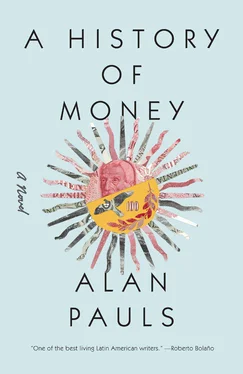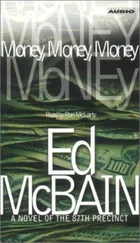He’s moved by his father’s shame, much more than by the juggling act he discovers he performed in order to return the money he’d entrusted to him, trebled in that stunningly short period. His shame, more than the ordeal of emergencies, danger, and last-gasp efforts he had to go through. He’s moved by the fact that once he’d got the money back, he kept the lengths he had to go to in order to recover it secret. But what moves him most — now that his father has closed his eyes and is once more abandoning himself to sleep, exhausted by the effort of remembering, which is as titanic an undertaking as the epic tale he lived through during those ten desperate days — is seeing him getting muddled and losing his way among numbers, precisely where he’s always been a beacon. He doesn’t know what day it is; he’s incapable of figuring out how much time separates two events; years and dates become particles blending together blindly in chaos. Temperatures, quantities, prices: anything that can be measured or counted, which has always been his element, is now a swamp in which he trips and falls and makes a fool of himself — a fool: the nightmare he has spent his whole life avoiding at any cost. Over the next few days, he often complains of having his temperature or blood samples taken five, six times a day, which happens nowhere but in his imagination, or indignantly protests that he’s only had one meal and one visitor in forty-eight hours, when the supply of food is in fact perfectly regular and his visitors so numerous that the head nurse has to step in and limit them. When he’s transferred to a normal room, having for a moment convinced everyone that this long hospital stay will soon be nothing but a bad memory, he’s amazed countless times to see actresses he had thought dead alive and kicking on the TV (an element that’s almost as innate to him as numbers), and surprised countless more times when he asks after people long buried, TV presenters or reporters whose deaths he was among the first to tell everyone about, having always been quick with breaking showbiz news. And how many times must the famous German-speaking nurse — the only one in the whole hospital, according to his father; in fact one of four or five who regularly patrol the floor, as he verifies for himself one day when he’s a little weary of the exalted picture his father ceaselessly paints of her; in any case the only one to whom his father, naturally overlooking the fact that he has delegated the task to others, contrives time and again to give money, slipping it into the pocket of her uniform when she leans over him (in his version to sing “Schlaf, Kindlein, schlaf!” to him; in hers to give him a pill or change his dressing) — how many times must she beckon to him discreetly from the door to the room, so that his father won’t notice, and, seeming touched but uncomfortable, as though she’s just endured the lascivious advances of an elementary school student, return to him the few measly coins or the exorbitant sum his father has slipped her as a tip without her noticing.
It all disappears so quickly, anyway, swallowed by the hunger of the present moment. One year later there’s nothing, not a penny left of that money, the modest capital his father saves from depreciation — recklessly or not, it doesn’t matter anymore — by entering it into the Russian roulette of financial speculation, and which he himself immediately changes into dollars, on his father’s advice. It’s devoured by the construction work, inflation, the fees charged by the architect — who slams the door on his way out the day he gets his last payment, disappointed that he hasn’t received the compensation he’d expected, and shatters the stained-glass window by the front door, his proudest addition to the house. Still, he has a house, a splendid house, his first. And when he’s struck by nostalgia and he misses having cash, misses banknotes and their comforting readiness to serve, he often consoles himself by telling himself that no, he hasn’t lost it, the money just looks different now, and it can be changed back to its previous form whenever he wants.
Two months after they move in, when he’s been terrified by the amount of water that accumulates in the roof’s covered gutters after forty-eight hours of torrential rain, eventually soaking through the ceiling and falling into the bedroom in a cascade, directly onto the lamb’s wool slippers he puts on every morning of the year, summer and winter alike, he follows in the architect’s footsteps and disappears. He leaves the apartment and never comes back. For a while his ex-wife vegetates in her nightdress in the still uninhabited living room, in shock. Later, thinking less of the house than his toiletry bag, his clothes, his books, his music, and the piles and piles of videotapes he’s left in the top room, which he never comes back to fetch, she quickly finds a buyer, sells the house off cheaply, and gives him his half. Minus costs and extras, it’s roughly the same amount in dollars that his mother’s husband gave him a year and a half earlier. The famous wad of a hundred hundred-dollar bills. It’s magic: eighteen months obliterated at a stroke, as if nothing had ever happened. He looks at these crisp, new, identical notes, and can’t believe it; he asks himself if they’re the same ones. There’s no doubt about it: money doesn’t change. This is one of its secret, miraculous laws. Everything else does, though. Him, for a start: he’s older, more abject, more cowardly. And just like every other time he decides to be single again — returning to the damp but always welcoming darkness that he knows so well, which though it soon becomes suffocating he comes back to at intervals, hopelessly and as hungrily as an addict or an orphan — he realizes that if there’s one person he can depend on, it’s his father. And so he goes to the travel agency, puts the wad of dollars on his desk, and asks him to put together a tailor-made trip to Europe. And with that, the money vanishes, is translated once more: countries, cathedrals, crappy hotels, a coat for the rain. He comes back sick and fatter, with a cracked molar (a rogue falafel full of unidentified hard bits), tendonitis in his right ankle (from weeks of walking on the edge of his foot to keep the holey sole of his shoe off the rainy European sidewalks), and no clothes (his suitcase having been stranded in baggage purgatory).
He’s pitiful. If he even had as much financial sense as a clochard. He spends a good part of his stay in Paris watching them, at first tenderly and then consumed by uncontrollable envy. His favorites: the one who installs himself with his bottle of wine and his newspapers in one of the glazed public phone booths that nobody uses anymore and whose doors it’s almost impossible to open without dislocating a shoulder; the one who patrols the block barefoot in the middle of winter, periodically giving out an alarmed or threatening shout that nobody understands; the one who sleeps on a stairway landing at the metro station, protected by her retinue of dogs. He never gives them money. It’s not that he doesn’t have any — although it’s the end of his trip and he’s treasuring his last handful of traveler’s checks as devotedly as if they were undiscovered works of art. He doesn’t know how to approach them, what to say to them, how to behave as he drops a coin in their hat or dented aluminum bowl. He doesn’t want to insult them. He watches them counting their donations and is moved to tears by the rapt care with which they examine and classify the coins, putting some in a pocket and keeping others — the ones they’ll have to use soon — in the palm of a blackened hand. And when he gets back, he’s as dirty as they are, and just as asocial and indifferent, only what in them is distance and dandyism is, in him, pure desperation.
Читать дальше












